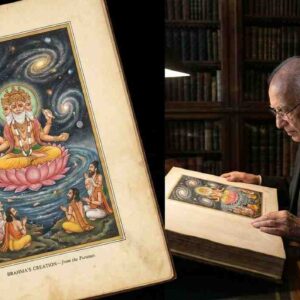What Is Hinduism? Religion, Philosophy, or a Guide to Liberation?
Hinduism, often described as the world’s oldest religion, transcends the conventional definition of faith. It is not confined to rigid doctrines or a single founder. Instead, it is a way of life—a vast philosophical system offering a guide to liberation (moksha). Rooted in the principles of dharma (duty), karma (cause and effect), and the pursuit of ultimate truth, Hinduism provides a framework for understanding the self, the universe, and the interconnectedness of all existence.
More than a religion, Hinduism is an evolving spiritual ecosystem, embracing diversity in beliefs and practices. Its teachings have profoundly shaped global spiritual thought, making it not just an Indian tradition but a universal guide to human potential.
Yoga: India’s Gift to the World
Perhaps the most notable contribution of Hinduism to global spirituality is yoga. Originating over 5,000 years ago, yoga combines physical postures (asanas), breath control (pranayama), and meditation (dhyana), offering a holistic approach to physical, mental, and spiritual well-being.
According to the 2024 report by the International Yoga Federation,over 400 million people worldwide practice yoga, including 55 million in the United States. The declaration of June 21 as International Yoga Day by the United Nations, an initiative led by India, reflects yoga’s universal appeal. By 2025, this day has become a global celebration of wellness, promoting unity and mindfulness across 190 countries.
While often reduced to a fitness regimen in the West, yoga’s philosophical underpinnings—rooted in theYoga Sutras of Patanjali—are gaining recognition, encouraging practitioners to explore its deeper spiritual essence.
Meditation and Mindfulness Practices
Hinduism’s emphasis on meditation has profoundly shaped global spiritual practices, influencing movements like mindfulness and transcendental meditation (TM). Guided by the principles found in the Bhagavad Gita and Upanishads, meditation aims to quiet the mind and foster self-awareness.
Transcendental Meditation, popularized by Maharishi Mahesh Yogi in the 20th century, is grounded in Vedic principles and has gained scientific validation for its mental health benefits. Research published in 2023 by the American Psychological Association highlighted TM’s ability to reduce anxiety, lower blood pressure, and improve cognitive function.
Mindfulness, though often associated with Buddhism, also draws from Hindu practices. Its global adoption in corporate wellness programs and therapeutic interventions underscores the universal relevance of Hindu philosophies of presence and awareness.
Hindu Philosophies in Modern Spiritual Movements
The Hindu concepts ofkarma(cause and effect),dharma(duty), andmoksha(liberation) have become cornerstones of global spiritual discourse. These principles resonate deeply with seekers worldwide, inspiring modern spiritual movements like the New Age philosophy, which incorporates ideas of reincarnation and universal consciousness.
Swami Vivekananda’s historic address at the 1893 Parliament of the World’s Religions in Chicago marked a turning point in introducing Hindu philosophy to the West. His emphasis on universal tolerance and spiritual unity continues to influence global thought, with organizations like the Ramakrishna Mission carrying his message forward.
Ayurveda: The Science of Life
Ayurveda, the Hindu system of medicine, has become a globally recognized alternative healthcare approach. Focused on balancing the body, mind, and spirit, Ayurveda emphasizes natural remedies, dietary regulation, and lifestyle alignment.
By 2023, the Global Wellness Institute reported the Ayurvedic wellness market at$9.5 billion, with significant adoption in the US, Germany, and Australia. Practices like detoxifying diets, herbal treatments, and yoga-based therapies have found integration into mainstream healthcare.
Environmental Ethics and Hinduism
Hinduism’s reverence for nature and its principle ofAhimsa(non-violence) have influenced global environmental movements. Rituals honoring rivers, trees, and animals embody the philosophy of living in harmony with nature.
Eco-conscious Hindu practices have inspired initiatives like afforestation drives and wildlife conservation projects globally. The teachings of theBhagavad Gitaon respecting all life forms resonate deeply with modern environmental ethics, aligning with global sustainability goals.
Cultural Exchange Through Festivals and Arts
Hindu festivals like Diwali and Holi have become global celebrations of unity and joy. Diwali, symbolizing the victory of light over darkness, is now recognized in countries like the US and UK, with public monuments illuminated in its honor. Similarly, Holi’s vibrant festivities have inspired similar events across Europe and North America.
Indian classical arts, such as Bharatanatyam and Odissi, rooted in Hindu spirituality, have found audiences worldwide, influencing global performance art and fostering cultural exchange.
Conclusion
Hinduism’s influence on global spiritual practices reflects its timeless wisdom and universal relevance. More than a religion, it serves as a guide to inner peace, self-awareness, and harmony with the cosmos. As cultural exchanges continue to flourish, preserving the depth and authenticity of Hindu teachings is vital to honoring their legacy while enriching global spirituality. Hinduism’s enduring principles not only address individual well-being but also offer solutions to the collective challenges of an interconnected world.










